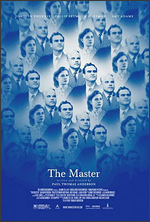| |
2010s |
| |
20,000 Days on Earth, Directed by Iain Forsyth and Jane Pollard
The Artist, Directed by Michel Hazanavicius
Blue is the Warmest Color, Directed by Abdellatif Kechiche
The Descendants, Directed by Alexander Payne
Exit Through the Gift Shop, Directed by Banksy
Force Majeure, Directed by Ruben Östlund
Holy Motors, Directed by Leos Carax
I Love You Phillip Morris, Directed by John Requa and Glenn Ficarra
It Follows, Directed by David Robert Mitchell
The Master, Paul Thomas Anderson
Midnight in Paris, Directed by Woody Allen
Museum Hours, Directed by Jem Cohen
Room 237, Directed by Rodney Ascher
The Tree of Life, Directed by Terrence Malick
Yossi, Directed by Eytan Fox |
|
|
The Master, Directed by Paul Thomas Anderson
The Weinstein Company, September 14, 2012 (US)
Screenplay: Paul Thomas Anderson
Starring: Joaquin Phoenix, Philip Seymour Hoffman, and Amy Adams
I am processing my reaction to The Master, akin to Lancaster Dodd processing his protégés, except of course that my thoughts are not people and there isn’t a dark cloud shadowing my motives. I do not seek to skew anybody’s thinking here. I am simply processing my reaction to a painful yet engrossing study of human frailty, susceptibility, compassion, and destruction.
Going in to the film, I had ideas that it would be a complete condemnation of Scientology or like-minded organization, or perhaps just a condemnation of fanaticism in general. I assumed it would be black and white in its depiction of the obvious and inherent dangers and evils of cults, and while I cannot deny that these elements hang like a veil over the proceedings, what is confounding—downright disturbing—is the overall likability of Dodd. It is a likability that is at significant odds with feelings born upon watching his frighteningly manipulative methods. The dichotomy is difficult to reconcile. Similarly, despite seeing his desperate need for validation as well as hints at a Kurtz-in-the-jungle-drunkenness-on-power, I couldn’t help but feel that Dodd’s motives were simultaneously rooted in a place of deep compassion.
I wasn’t expecting to like Dodd at all, and yet throughout, I found myself drawn to him, as if I was falling under his masterful, hypnotic techniques of mind-control. Certainly, Philip Seymour Hoffman’s performance deserves high praise for soliciting such a powerfully polarizing response, but I also think credit goes to a script that is not hellbent on reducing itself to an exercise in pure whistle-blowing. As a result, the story not only feels richer and far more profound than the one I assumed I was going to experience, but it manages to pull the rug from under my preconceived notions of the black and white boundaries of evil.
And further complicating my feelings, even with regard to Dodd’s flaws, part of me wonders if he is capable of seeing through the soil of his own hubris to be able to realize the dangers that align the rabbit hole of his own tunnel vision. Maybe he really believes that the end justifies the means or that someone as intelligent, insightful, and compassionate as himself is only ultimately capable of helping, of healing.
The film is not an easy experience. To witness human beings pushed to the brink and beyond is not something, upon completion, that you are likely to want to revisit anytime soon. But revisit it you do, in your mind, processing the complexity of your reaction. Maybe, like Dodd, it is because of inherent compassion that you simply cannot look away.
-G

|
|
 |

